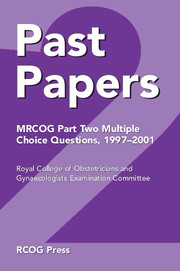March 1998
Published online by Cambridge University Press: 05 July 2014
Summary
A recognised association exists between polyhydramnios and
1. anencephaly.
2. an imperforate anus in the fetus.
3. fetal polycystic kidneys.
The following have a recognised association with transverse lie of the fetus in late pregnancy or labour:
4. microcephaly.
5. high parity.
6. a bicornuate uterus.
Factors characteristically associated with the spontaneous onset of premature labour include
7. oligohydramnios.
8. urinary tract infection.
9. presence of vaginal group B haemolytic streptococcus.
The following statements concerning the bony pelvis are correct:
10. The angle of inclination of the pelvic brim is greater in Negroid than in Caucasian women.
11. In the anthropoid type of female pelvis, the anteroposterior diameter of the inlet is significantly greater than the transverse.
12. A straight sacrum is associated with a narrow subpubic angle.
13. The sacrosciatic notch is significantly wider in an android pelvis.
14. The female pelvis is characteristically shallower than the male pelvis.
The following are recognised to cross the placenta in clinically significant quantities:
15. indomethacin.
16. lithium.
17. cholestyramine.
18. podophyllotoxin.
19. propylthiouracil.
Amniocentesis
20. carries an increased risk of orthopaedic deformity as a sequel.
21. has a risk of chorioamnionitis in 3–5% of cases.
The following are recognised complications of the use of an intravenous oxytocin infusion:
22. neonatal jaundice.
23. maternal hyperglycaemia.
Compared with vacuum extraction, a Kielland forceps delivery is associated with an increased incidence of
24. neonatal jaundice.
25. subgaleal haematoma.
26. facial palsy.
Information
- Type
- Chapter
- Information
- Past Papers MRCOG Part Two Multiple Choice Questions1997–2001, pp. 32 - 46Publisher: Cambridge University PressPrint publication year: 2004
